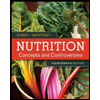Energy Drinks and Soda 1) Pick an energy drink or soda.Examples: red bull, 5 hour energy, monster, rock star, Coke, Pepsi, etc.. 2) Review the ingredients- list which are familiar from class (ex: thiamin, a B vitamin), and which ones we have not covered as nutrients (ex: guarana, taurine). All ingredients should be categorized. And then answer these questionsWhy are nutrients we have covered, such as B-vitamins, included in these beverages?Do you think ingredients in these drinks are regulated?How much caffeine is in the drink compared to 1 cup (8oz) of coffee?Does your drink have weight loss claims? What claims are on the package?Are you comfortable consuming energy drinks and soda? Do unfamiliar ingredients concern you?
Essential nutrients
These are the organic compounds present in the food that provide nourishment essential for the development and growth of our body. Nutrients not only provide us with the required energy to carry out various biological processes but are also the building blocks for repair and growth in our bodies.
Vitamins
The vitamins are organic molecules required in low concentration for the proper functioning of the body. They cannot be generated in the organism and are taken into the body through the diet. The lack of proper vitamins results in diverse deficiency disorders. They are thus called essential nutrients. The important vitamins are vitamin A, vitamin B complex, vitamin C, vitamin D, vitamin K, and vitamin E.
An energy drink is a commercial beverage that has added stimulants such as caffeine and glucose. This is believed to raise the energy levels of the consumer. Soda is a carbonated soft drink with added sweeteners and flavoring agents.
Caffeine is a naturally occurring chemical substance in beverages like tea, coffee, and cocoa. It acts as a stimulant of the central nervous system. It increases alertness, concentration, relieves drowsiness, and helps stay awake. The maximum permissible caffeine intake in adults is less than 400 mg per day and less than 100 mg in children.
Trending now
This is a popular solution!
Step by step
Solved in 3 steps








